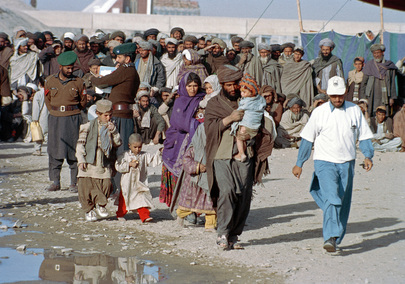Afghanistan: Returns of Afghans creating multi-layered human rights crisis

The surge in the number of Afghans forced or compelled to return to Afghanistan this year is creating a multi-layered human rights crisis requiring the urgent attention of the international community.
Since January, over 1.3 million people have been largely compelled to head back to Afghanistan - a country where 70 per cent of the population lives in poverty. Many have been forcibly deported from countries like Iran and Pakistan, while others have felt pressured to leave due to threats, harassment and intimidation. The returns are happening at a time when humanitarian operations remain woefully underfunded, forcing difficult choices between food, shelter, and safe passage.
According to Save the Children, around 80,000 Afghan children returned from Iran in June, including 6,700 unaccompanied minors.
Women and girls are particularly at risk upon their return, as they are returning not only to dire economic hardships but to a context where their access to basic services and social protections remains severely constrained. The UN has repeatedly highlighted the assault on women’s rights under Taliban rule, including bans affecting higher education, employment and freedom of movement. Recently, the International Criminal Court issued arrest warrants for the Taliban’s “Supreme Leader” and Chief Justice, who are accused of the crime against humanity of persecution on gender and political grounds.
Other at-risk returnees include journalists, former civil servants, and those who worked for the previous Afghan government, who may face reprisals or torture upon return.
UN experts have repeatedly warned that these returns may violate the principle of non-refoulement referenced in UNHCR’s February 2023 non return advisory. They reiterated that States, due to the sheer quantity and forceful nature of returns, cannot ensure that Afghan nationals have access to fair procedures where their individual protection needs are fully assessed. Many Afghans have experienced discrimination, mistreatment, arbitrary arrest and detention, raising serious concerns under international refugee and human rights law.
UN High Commissioner for Human Rights Volker Türk calls for an immediate halt to the forcible return of all Afghan refugees and asylum-seekers, particularly those at risk of persecution, arbitrary detention, or torture upon their return. Countries in the region must ensure that returns to Afghanistan are voluntary, safe, dignified, and consistent with international law.
Roza Otunbayeva, the UN Secretary-General's Special Representative for Afghanistan, emphasizes the critical need for reintegration assistance, stating, "Afghanistan's stability depends on shared responsibility. We cannot afford indifference. The cost of inaction will be measured in lives lost and conflicts reignited."

